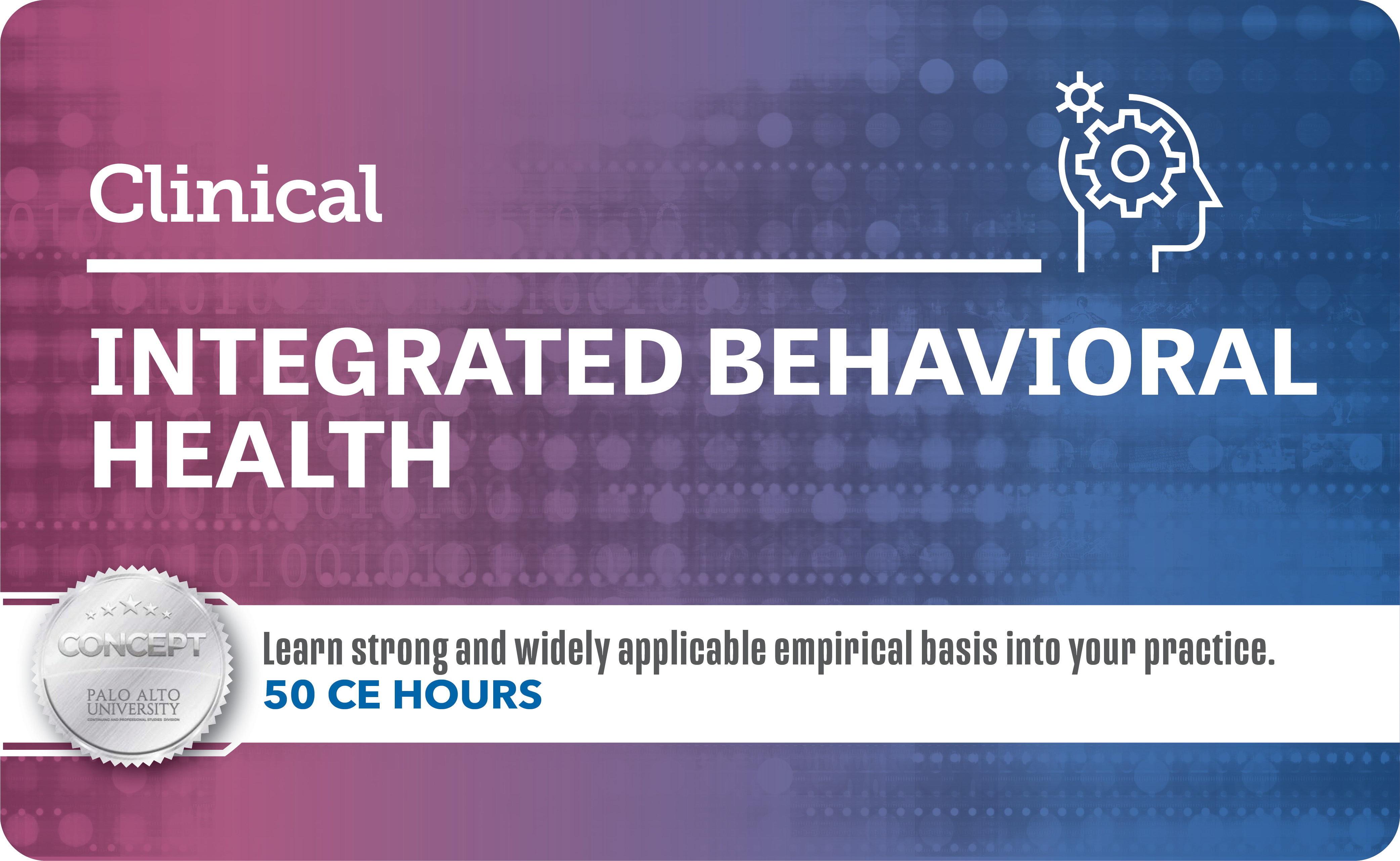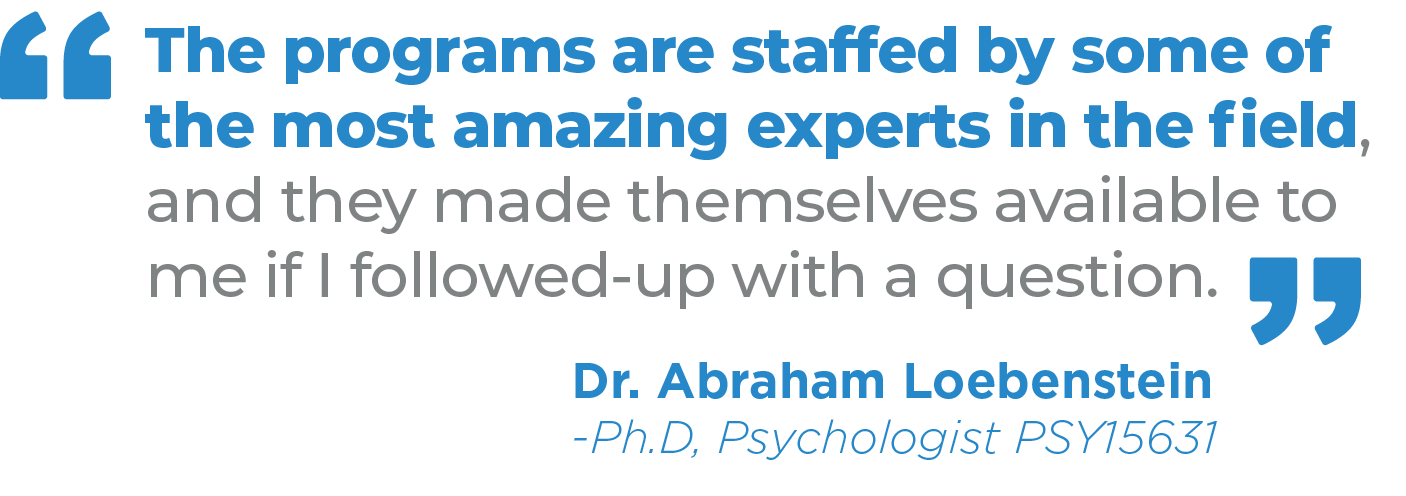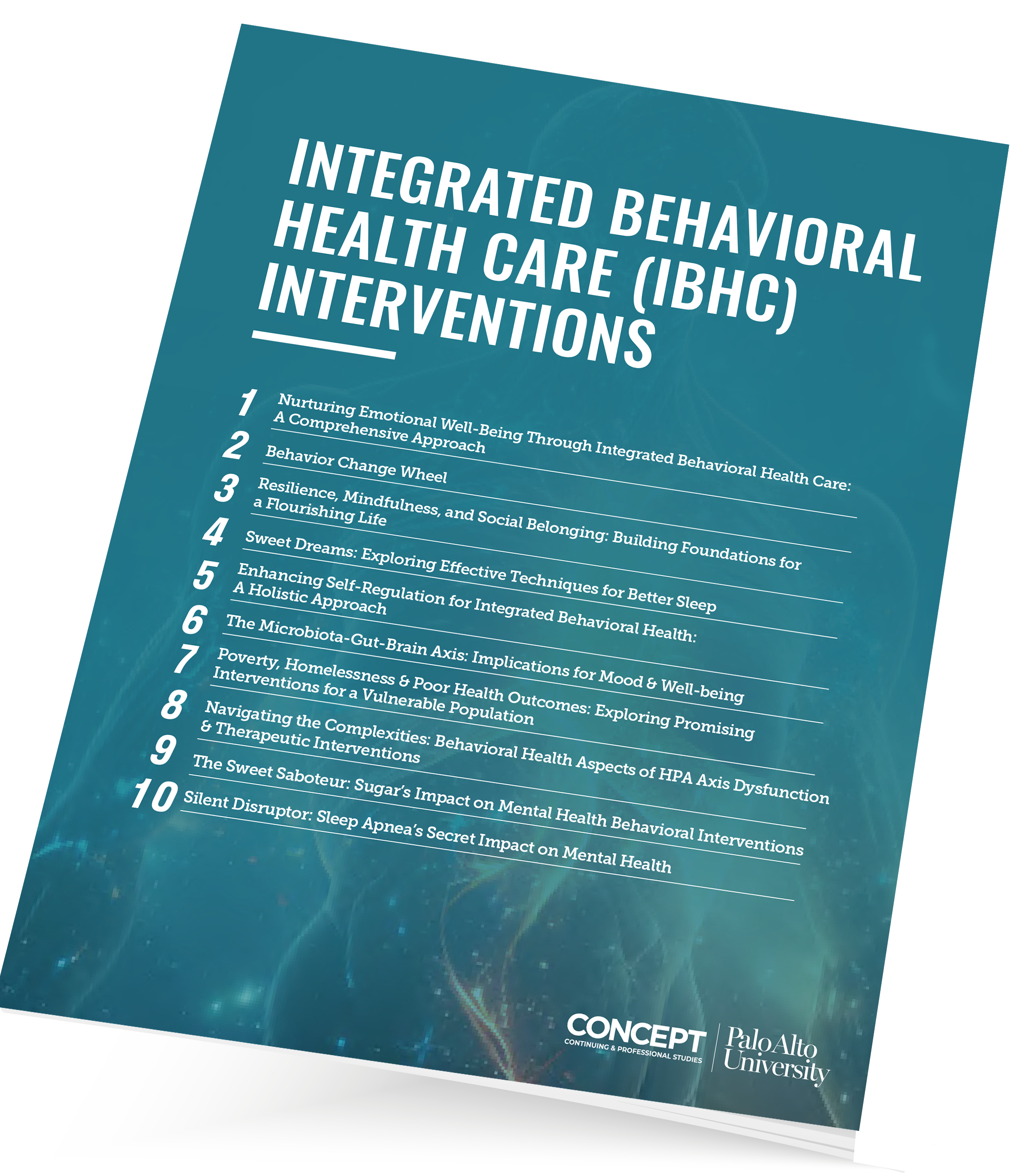Now Available!
Provide Evidence-Based, Holistic Care to Your Patients
Enroll in our IBH certificate to gain an enhanced understanding of the interconnectedness between behavioral and physical health, improve the level of care you offer patients and add a new credential to your resume. Designed to propel your career to new heights, our comprehensive curriculum equips you with the essential skills and knowledge necessary to excel as a behavioral health provider.

Enroll Now:
To enroll in the full certificate program, add all of the Foundational Programs and 15 of the Advanced Topic Programs linked below to your cart.
The IBH Certificate includes 50 CE Hours for $3,250.
Please contact us at caps@paloalotu.edu with any enrollment questions.

CONCEPT
What You Can Expect
Integrative behavioral health is a type of whole-person care focusing on the interconnections between the body, mind, and physical actions. As such, integrated behavioral health can include a diverse variety of topics, including mental health, life stressors and crises, nutrition, sleep, stress-related physical symptoms, substance misuse, and other additive and problematic behaviors. Because clients with mental health problems often suffer from co-occurring physical health issues that can negatively impact neurological, biological, psychological, environmental, intrapersonal, and social health, providing services through an integrated behavioral health lens may result in improved outcomes.
This certificate aims to enhance the understanding of the interconnectedness between behavioral health issues and physical health problems and is geared toward behavioral health providers. The Integrative Behavioral Health Certificate includes 50 CE Hours for $3,250.
The Integrative Behavioral Health Certificate
includes 50 CE Hours for $3,250.
You will learn to:
- Define integrated behavioral health and other related terms
- Describe why collaborative care between behavioral health and medical care providers is essential to improved client outcomes
- Describe the factors that can positively impact behavioral health and well-being
- Describe the common disparities impacting clients diagnosed with co-occurring behavioral health and physical health conditions
- Describe the prenatal and neurobiopsychosocial factors that can contribute to poor behavioral health outcomes
- Describe the benefits associated with implementing an integrated behavioral health approach
- Describe the Adverse Childhood Experiences (ACEs) research, complex and developmental trauma, and toxic stress and their impact on behavioral health and wellness throughout the lifespan
- Describe behavioral health interviewing, screening, and intervention options available for clients diagnosed with co-occurring mental health and physical health disorders
- Describe empirical research findings pertaining to the topic of integrated behavioral health
Foundational Programs
Includes 35 hours / 35 CEs towards the Certificate in Integrated Behavioral Health
To enroll in the full certificate program, add all of the Foundational Programs to your cart as well as 15 of the Advanced Topic Programs below.
The IBH Certificate includes 50 CE Hours for $3,250.
Please contact us at caps@paloalotu.edu with any enrollment questions.
- Integrated Behavioral Health: An Overview (3 hours)
- ACEs, Complex Trauma, and Toxic Stress: Implications for Affect, Behavior, Cognition, and Physical Health (2 hours)
- Trauma-Informed Integrated Behavioral Health Care (3 hours)
- Behavioral Health Aspects of Hypothalamic-Pituitary-Adrenal (HPA) Axis Dysfunction (3 hours)
- Psychoneuroimmunology through a Behavioral Health Lens (3 hours)
- Alexithymia and Poor Health Outcomes (3 hours)
- Sickness Behavior (3 hours)
- Severe Mental Illness and Metabolic Dysfunction (3 hours)
- Sedentary Behavior: Implications for Health and Wellness (3 hours)
- Poverty, Homelessness, and Health Disparities (3-hours)
- Burnout, Vicarious Trauma, and Compassion Fatigue (3 hours)
- Gratitude, Optimism, and Joy: Implications for Health and Wellness (3 hours)
Advanced Topics
Choose 15 hours from the following advanced specialty topic programming to complete the Certificate in Integrated Behavioral Health. (Each topic equals 1 hour.)
- Behavioral Health Aspects of Toxic Stress Exposure
- Behavioral Health Aspects of Adverse Childhood Experiences (ACEs)
- Behavioral Health Aspects of Resilience
- Behavioral Health Aspects of Insomnia
- Behavioral Health Aspects of Sleep Apnea
- Behavioral Health Aspects of Self-Regulation Deficits
- Behavioral Health Aspects of Screentime Misuse
- Food Insecurity: Clinical and Forensic Mental Health Considerations
- Socioeconomic Disadvantage: Implications for Mood, Behavior, Cognition, and Physical Health
- Behavioral Health Aspects of Type 2 Diabetes
- Behavioral Health Aspects of Obesity
- Behavioral Health Aspects of Fatigue
- Behavioral Health Aspects of Tobacco Exposure
- The Western Diet
- Health-Promoting Leadership
- Microbiota-Gut-Brain Axis: Implications for Mood, Behavior, Cognition, and Physical Health
- Excessive Sugar Consumption: Implications for Mood, Behavior, Cognition and Criminality
- Prenatal Toxic Stress and Trauma Exposure: Implications for Mood, Behavior, Cognition, and Criminality
- Chronic Low-Grade Inflammation: Implications for Mood, Behavior, Cognition, and Physical Health
- Health Disparities: Implications for Mood, Behavior, Cognition, Physical Health, and Criminality
- Trauma-Informed Telehealth
- Metacognitive Deficits: Implications for Mood, Behavior, Cognition, Physical Health, and Criminality
- Integrated Behavioral Health and the Criminal Justice System
- Blood Sugar Dysregulation: Clinical and Forensic Implications
Download our Free eBook
This comprehensive eBook is perfect for practitioners looking to expand their skillset and researchers seeking the latest insights in integrated behavioral health care.
Submit your email to get your copy now.


















